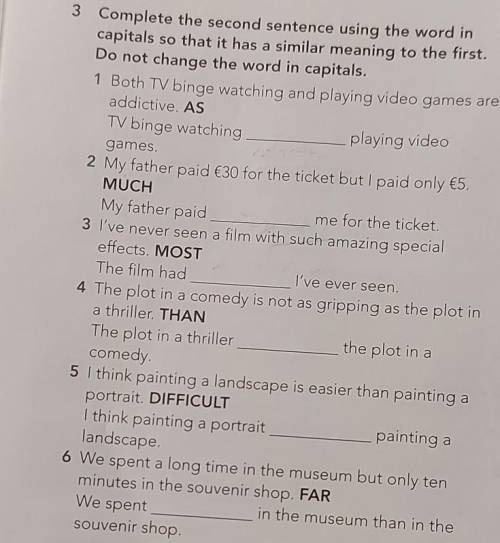Complete the second sentence using the word in capitals so that it has a similar meaning to the first.
Do not change the word in capitals.
1 Both TV binge watching and playing video games are
addictive. AS
TV binge watching
playing video
games.
2 My father paid €30 for the ticket but I paid only €5
MUCH
My father paid
me for the ticket.
3 I've never seen a film with such amazing special
effects. MOST
The film had
I've ever seen
4 The plot in a comedy is not as gripping as the plot in
a thriller. THAN
The plot in a thriller
the plot in a
comedy
5 I think painting a landscape is easier than painting a
portrait. DIFFICULT
I think painting a portrait
painting a
landscape.
6 We spent a long time in the museum but only ten
minutes in the souvenir shop. FAR
in the museum than in the
souvenir shop
We spent

Другие вопросы по теме Английский язык
Популярные вопросы
- Подготовить рекламную компанию продукта: образование.либо предмета...
1 - Open the brakets and use the verbs in the correct form. here reply)...
3 - Вчем отличие гатчинского дворца от михайловского...
2 - Какова проблема смахивает прозрачные слезы, мне хочется ее, но она...
3 - На какую предельную высоту можно поднять воду поршневым насосом при...
3 - Не получается разложить на множители два выражения: 1) с(в квадрате)-16с...
3 - Если можно, две последние с решением: 1. масса фотона связана с длиной...
3 - Семя пшеницы запас питательных веществ яйцо куриное зародыш и метки:...
2 - Написать не большое сочинение на одну страницу по теме: косметика...
3 - Вначинку для земляничного пирога кладут 4 части земляники и 1 часть...
2
- TV binge watching is as addictive as playing video games.
- Explanation: The word "as" is used to show the similarity or equality between two things. In this case, both TV binge watching and playing video games are considered addictive.
- Step-by-step solution: Replace "are" with "is" to match the subject-verb agreement. Then, add the word "as" before the word "addictive" to show the similarity.
2. My father paid €30 for the ticket but I paid only €5.
- My father paid much more for the ticket than I did.
- Explanation: The word "much" is used to compare the difference in quantity or price. In this case, it indicates that the father's payment was significantly higher than the speaker's payment.
- Step-by-step solution: Replace "€30" with "much more" to show the comparison in payment. Also, add "did" at the end of the sentence to create a parallel structure with the verb "paid."
3. I've never seen a film with such amazing special effects.
- The film had the most amazing special effects I've ever seen.
- Explanation: The word "most" is used to show the highest degree or level of something. In this case, it emphasizes that the film had the highest level of amazing special effects the speaker has ever seen.
- Step-by-step solution: Remove "I've never seen a film with" and replace it with "the film had." Then, add "the most" before "amazing special effects" to indicate the highest level.
4. The plot in a comedy is not as gripping as the plot in a thriller.
- The plot in a thriller is more gripping than the plot in a comedy.
- Explanation: The word "more" is used to compare two things and indicate a higher level or degree. In this case, it states that the plot in a thriller is of a higher level of gripping than the plot in a comedy.
- Step-by-step solution: Remove "not as" and replace it with "more." Then, change the word order to place "the plot in a comedy" before "the plot in a thriller."
5. I think painting a landscape is easier than painting a portrait.
- I think painting a portrait is more difficult than painting a landscape.
- Explanation: The word "more" is used to indicate a higher level or degree when comparing two things. In this case, it implies that painting a portrait requires a higher level of difficulty than painting a landscape.
- Step-by-step solution: Remove "easier than" and replace it with "more difficult than." Then, change the word order to place "painting a landscape" before "painting a portrait."
6. We spent a long time in the museum but only ten minutes in the souvenir shop.
- We spent far more time in the museum than in the souvenir shop.
- Explanation: The word "far" is used to emphasize a large difference in quantity or time. In this case, it emphasizes that the speaker spent significantly more time in the museum than in the souvenir shop.
- Step-by-step solution: Remove "a long time" and replace it with "far more time." Then, change the word order to place "in the museum" before "in the souvenir shop."